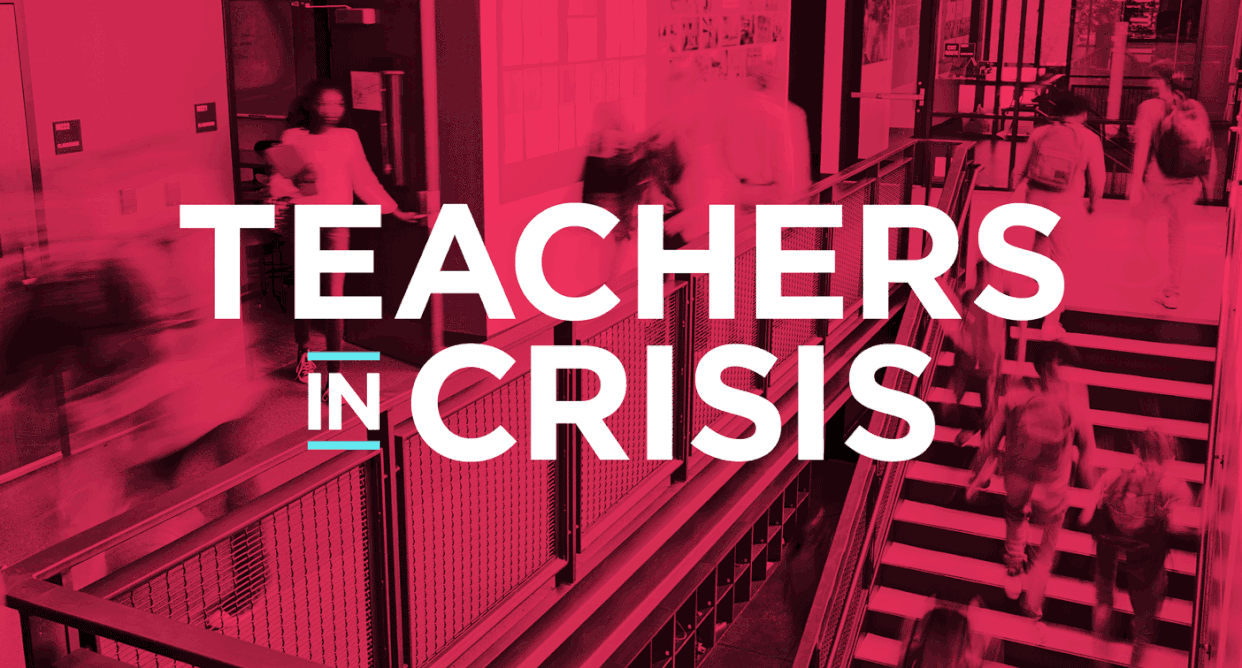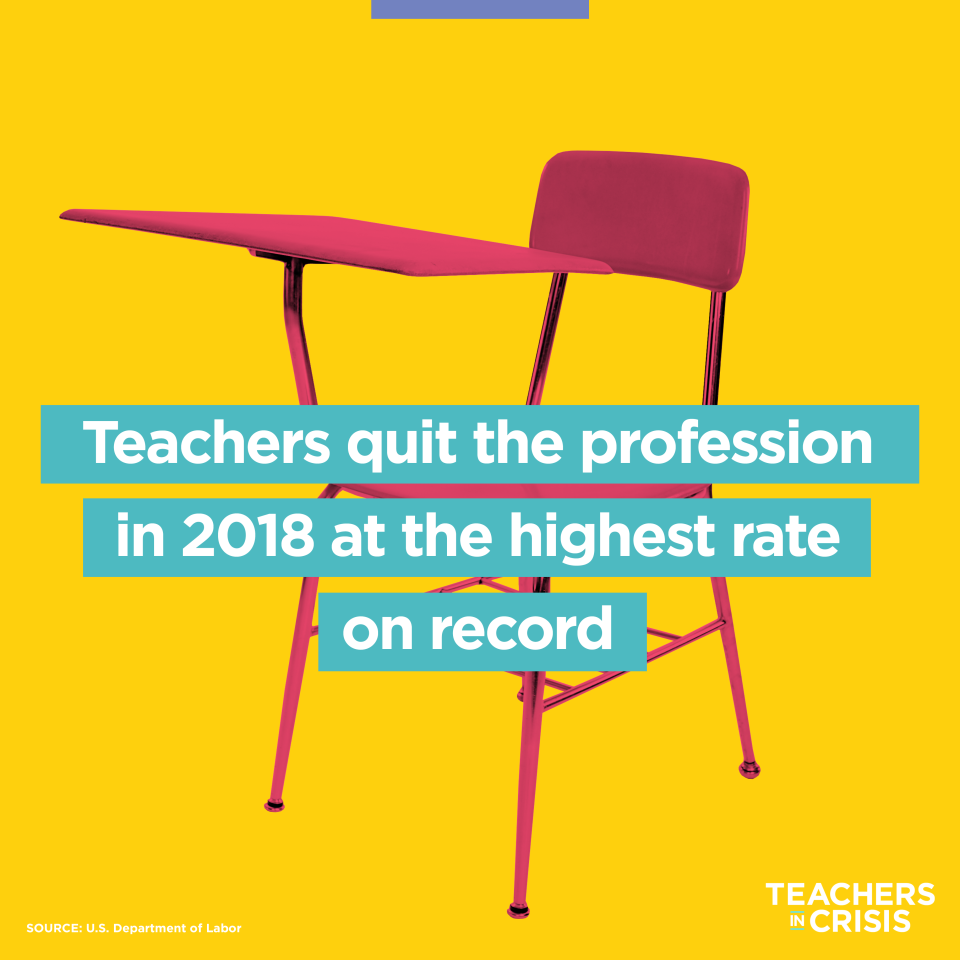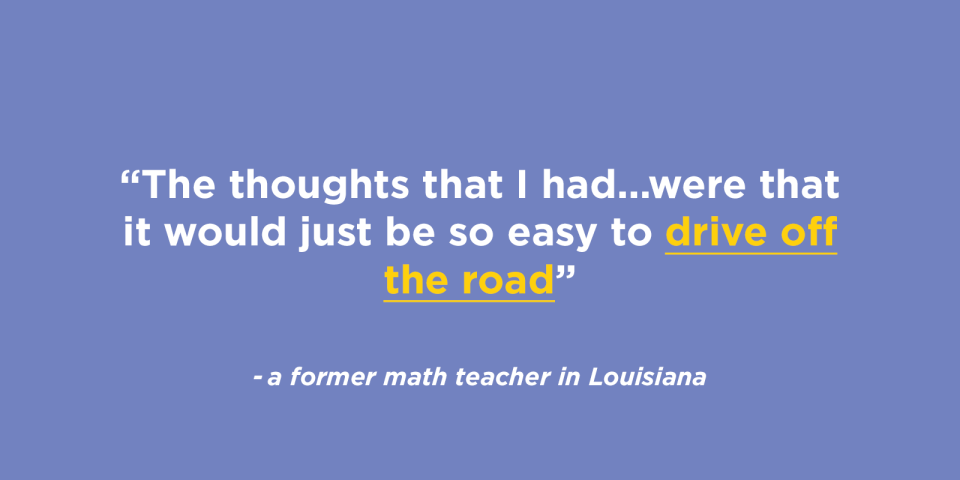'Things have just gotten so bad': Why teachers in America are leaving the classroom for good

The word teacher, for many, has long been synonymous with hero.
On social media, political stages and news sites, teachers are hailed as indefatigable public servants, selflessly working to shape the next generation of Americans. It’s a reputation they’ve undoubtedly earned, aided in part by how many roles (therapist, parent, first responder) they’re often forced to take on.
Of course, there are bad teachers, but the good ones are ubiquitous. Educators who give everything they have and then give more: donating kidneys, fostering their own students and literally taking bullets to tackle school shooters. Still, accurate as this heroic depiction may be, many feel it’s been misused in recent years to excuse undervaluing and mistreating educators across the country.
Because teachers, perhaps more than ever, know what they’re worth. And they’re fed up with others not acknowledging it too. “A lot of my colleagues are feeling overwhelmed by the burden that teaching has become,” Rachel Bardes, a former Spanish teacher in Florida, tells Yahoo Lifestyle. “Things have just gotten so bad.”
Teachers — as Bardes and more than 50 others shared in an exclusive Yahoo Lifestyle survey — are sick of budget cuts, classroom violence and salaries so low they need two extra jobs. They’re tired of standardized tests that stifle their creativity and a job that demands their every waking moment — even when they’re ill. As Sariah McCall, a teacher whose resignation letter went viral in April, wrote, “It is unrealistic to expect this much of people. We’re teachers, but we’re still people.”
Of the dozens of teachers who spoke with Yahoo Lifestyle, many said that the conditions they’ve endured are fuel to fight for better ones — a trend reflected in the historic statewide walkouts beginning in West Virginia in February 2018 (and rippling to five other states since). But for an increasing number of educators — whether due to family, personal well-being or other factors — it’s all simply too much to bear.
According to a Labor Department report (obtained by the Wall Street Journal), teachers quit the profession in 2018 at the highest rate of any year on record. Roughly 1 million public education workers walked away that year, and experts predict those numbers will only get worse. The result is shortages of teachers in multiple states and a dropping number of education majors nationwide.
To explore this national crisis, Yahoo Lifestyle conducted a survey aimed at teachers who made the decision — most in 2019 — to leave the classroom for good. More than 50 former K-12 public school teachers from over 20 states participated, sharing intimate details of ending a career that many imagined would last a lifetime.

“I’m very surprised that I am out of teaching,” says Charlie Cuddy, a former math teacher in Omaha, Neb., who now works as a software developer. “My mom always jokes with me that once I realized [being] in the NFL wasn’t a realistic opportunity, teaching was what I wanted to do — just, from as long as I can remember.”
Cuddy, whose dad has been a teacher for 40 years (and describes teaching now versus when he started as “night and day”), spent nine years as an educator. He, like many, was motivated to leave in order to have time to be with his kids. Others shared reasons like financial instability or budget cuts, but none seemed immune to the physical and mental toll taken by one of the most stressful jobs in America.
Multiple teachers described schedules that made it impossible to meet their basic needs, like going to the bathroom or eating lunch. “I am pretty sure my bladder has changed,” says Jamilah Pitts, a former English teacher in New York who had to send a staff email asking for classroom coverage any time she needed to use the bathroom. “[I’d write,] ‘Can someone please come relieve me?’”
For others, the implications were much more serious, either exacerbating or igniting mental health issues and spiraling at least four of those surveyed into suicidal thoughts. One such teacher (who requested anonymity in this story) recalls to Yahoo Lifestyle the feeling of desperation that made it clear that she needed to quit. “The thoughts that I had at the time were that it would just be so easy to drive off the road.”
Of the 50-plus teachers who volunteered their experience for Yahoo Lifestyle’s survey, 55 percent said their salary was too low to make ends meet (the average starting salary for teachers is $39,249). Nearly half of those polled said they worked between 50 and 60 hours a week, while 24 percent worked as many as 70 hours. The average American, in comparison, works 44 hours a week and earns $44,720 a year, according to the U.S. Bureau of Labor Statistics.

But as if low salaries and unpaid overtime weren’t enough, 100 percent of teachers surveyed reported having to dip into their own pockets to buy school supplies, kids’ lunches and/or other resources. Eighty-three percent said they spent over $500 of their own money per year; 28 percent of them spent over $1,000.
Nearly every teacher, when asked, said that out of everything they’re leaving behind, they will miss the students most of all. “It’s really hard,” says Cuddy. “I miss that part of it a lot — the relationships and watching them grow.”
Pitts, who now works as an administrator in a charter school, agrees. “It felt really selfish and really difficult to walk away from students,” she says. “Teaching was my life’s calling, it wasn’t just a job for me. But ultimately that was something that I had to rectify within myself. You cannot pour out if you are empty. And there were just many days when I was constantly empty and pouring out from an empty cup.”
“I feel grief about it,” says Bardes, who is now fighting for better rights for teachers nationwide. “When I think about it, I do tear up because this was my calling. But I want this grief and this sadness ... that’s what kind of fires me up.”
Karin Selchert, who left her teaching job to become a plumber (and now takes home double), hopes that these stories will inspire change. “The sad part to me as an educator is that I’m looking at people who can make a change — and they’re not making a change,” she says. “This affects everybody. If our students aren’t getting a good education from good teachers, where are they going to end up?”
If you’re a teacher who wants to share your story, send an email to [email protected]
Read more from Yahoo Lifestyle:
Florida teacher says the profession is no longer sustainable: ‘Who wants to be poor by choice?’
Thousands of teachers help each other purchase school supplies thanks to viral campaign
Follow us on Instagram, Facebook and Twitter for nonstop inspiration delivered fresh to your feed, every day.

